
|
![]()
Greatest Films of the 1960s
1960 | 1961 | 1962 | 1963 | 1964 | 1965 | 1966 | 1967 | 1968 | 1969
Title Screen Film Genre(s), Title, Year, (Country), Length, Director, Description 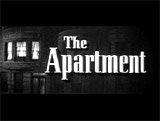


The Apartment (1960), 125 minutes, D: Billy Wilder
Director Billy Wilder's Best Picture-winner was a classic, caustically-witty, satirically cynical, melodramatic comedy about unethical, greedy, and corrupt corporate America politics in the year 1959 - and a bitter-sweet romance. The film's opening introduced a lowly, subordinate Manhattan office worker C. C. "Bud" Baxter (Jack Lemmon), one of "31,259 drones" staying on late by himself at his desk on the 19th floor at the impersonal Consolidated Life of New York insurance company (a shot paying homage to King Vidor's silent film classic The Crowd (1928)). The ambitious, lowly, misguided and young insurance clerk was waiting until his own apartment was vacated later that evening - after being used by married higher-up executives for their trysts and affairs. He reguarly and generously lent out the keys to his Upper West Side NYC apartment to his company's higher-up, philandering executives for romantic, adulterous, after-hours extra-marital trysts and affairs, including to his four unfaithful executive managers, including his callous and craven, fast-talking and authoritative married boss J. D. Sheldrake (Fred MacMurray). With his apartment neighbors, such as philosophizing Dr. Dreyfuss (Jack Kruschen), he was mistaken for a 20th century Don Juan lothario, partier and frequent alcohol imbiber. Meanwhile, Baxter "Bud" began to have a budding crush on the company's pixie-faced, charming, elfin elevator operator Miss Fran Kubelik (Shirley MacLaine). Bud didn't realize that Sheldrake was also womanizing with the vulnerable Fran, who turned melancholy when she became the latest conquest of his boss, behind his back. In a devastating sequence, Bud found Miss Kubelik unconscious and suicidally overdosed on sleeping pills in his apartment on Christmas Eve - after the irredeemable Sheldrake had told her that he couldn't commit to her. Still morose and recuperating in bed, Fran asked Bud: "Why can't I ever fall in love with somebody nice like you?" After her suicide attempt, in a kitchen sequence, Bud prepared an Italian spaghetti dinner for the two of them, dexteriously using a tennis racket to strain the pasta. In a New Year's Eve celebratory scene in a Chinese restaurant, Fran was being entertained by Sheldrake and learned that Bud had quit his job rather than lending out his apartment's key anymore. Fran rushed to Bud's apartment, realizing that he really loved her and had sacrificed his career for her; but when she reached the top of the stairs, she heard what she thought was a gun-shot - and was relieved when the door opened and Bud was holding a recently-uncorked bottle of champagne foaming over. During the curtain-closing scene - a card game (gin rummy) between Fran and Bud as the New Year dawned, he professed his love ("I absolutely adore you") and Fran responded by handing him a pack of cards and bluntly speaking the film's last line, still romantically reticent: "Shut up and deal!"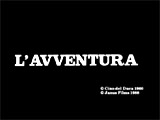
L'Avventura (1960, It./Fr.) (aka The Adventure), 145 minutes, D: Michelangelo Antonioni
The first part of a trilogy, followed by La Notte (1961, It./Fr.) (aka The Night) and L'Eclisse (1962, It./Fr.) (aka The Eclipse).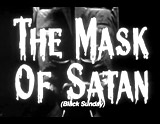
Black Sunday (1960, It.) (aka La Maschera del Demonio, or The Mask of Satan), 87 minutes, D: Mario Bava
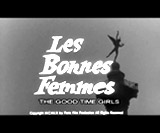


Les Bonnes Femmes (1960, Fr./It.) (aka The Good Time Girls), 100 minutes, D: Claude Chabrol
Chabrol's film was one of the French New Wave (Nouvelle Vague) films of its time (although never released in the US), and set in Paris (although photographed as drab and dingy). The dark and cynical melodrama followed the exploits of four "good time girls," all shop-girl clerks in an electrical appliance store, as they sought love, excitement, freedom, and escape at nighttime. However, each one had very different aspirations in life. The four included carefree party-girl Jane (Bernadette Lafont), aspiring night-club singer Ginette (Stéphane Audran), and marriage-fixated/engaged and social-climbing Rita (Lucille Saint-Simon). The main protagonist, sweet, shy, demure and sensitive Jacqueline (Clotilde Joano), a hopeless and vulnerable romantic, was tragically drawn to a mysterious, black-leathered motorcyclist Andre (Mario David), who was stalking her. He was mistaken as her long-awaited Prince Charming and turned out to be her executioner.


A Bout De Souffle (1960, Fr.) (aka Breathless), 90 minutes, D: Jean-Luc Godard
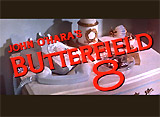

BUtterfield 8 (1960), 109 minutes, D: Daniel Mann


La Dolce Vita (1960, It./Fr.) (aka The Sweet Life), 174 minutes, D: Federico Fellini
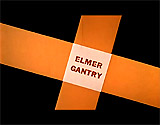

Elmer Gantry (1960), 146 minutes, D: Richard Brooks
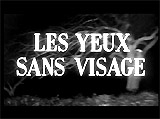

Eyes Without a Face (1960, Fr./It.) (aka Les Yeux Sans Visage), 88 minutes, D: Georges Franju
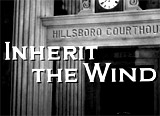

Inherit the Wind (1960), 127 minutes, D: Stanley Kramer
This absorbing liberal "message" film portrayed the famous and dramatic courtroom Scopes "Monkey Trial" battle (in the sultry summer of 1925 in Dayton, Tennessee) between two famous lawyers (Clarence Darrow and William Jennings Bryan), who heatedly argued both sides of the case. The film starred two major Oscar-winning giants and veterans of the cinema with remarkable career-high performances - Spencer Tracy (as Darrow- Henry Drummond) and Fredric March (as Bryan - Matthew Harrison Brady) - who had never before acted together in a film. Film-maker Stanley Kramer both produced and directed this film that modified and disguised the historical event by changing the names of the prototypical characters and making them fictional figures, and placing the action in fictional Hillsboro, Tennessee. Its story centered around the issue of evolution vs. creationism and the prosecution of 24 year-old Tennessee teacher John T. Scopes (in the film, Bert Cates played by Dick York) for violating state law by teaching the theory of evolution in a public school. [In fact, Scopes deliberately volunteered to challenge the Tennessee legislature's statutes and become the test case for the American Civil Liberties Union (ACLU) by teaching theories that denied the Biblical story of the divine creation of man.] The film's title was taken from the Biblical book of Proverbs 11:29: "He that troubleth his own house shall inherit the wind." Kramer's film was also designed as a protest against the repressive thinking of the 50s McCarthy era. Much of the film's story (and dialogue), written into a screenplay by Nathan E. Douglas (Nedrick Young was the blacklisted screenwriter's real name) and Harold Jacob Smith, was based on the successful Broadway play (by Jerome Lawrence and Robert E. Lee) that first starred Paul Muni and Ed Begley. In the Tennessee town of Hillsboro, high school teacher Bertram Cates tested a state criminal statute that forbade the teaching of the theory of evolution. Three-time Presidential candidate and literal-fundamentalist Matthew Brady volunteered to prosecute the case. A media hoopla and hysterical frenzy was whipped up in the sweltering hot town by opposing forces during the 12-day trial. Cynical and sarcastic newspaper reporter E.K. Hornbeck (Gene Kelly cast against type) (portraying acid-penned writer/reporter H.L. Mencken for the Baltimore newspaper) was behind the selection of notorious agnostic Henry Drummond to defend the schoolteacher. At first, Drummond was frustrated by the bias implicit in the trial, so he summoned Brady to the stand to interrogate him about his literal interpretations of the Bible. Through intense questioning, Brady was forced to admit that the Bible could be interpreted non-literally. Brady's admission opened the door to the idea that evolution was consistent with Biblical teaching. In the end, the conservative jury convicted Cates (Drummond had requested that the plea be changed to "guilty"), while the Judge (Henry Morgan) (to avoid further controversy) leniently fined Cates only $100. As Brady desperately gave one final religious defense as everyone dispersed, he had a stroke, collapsed and died.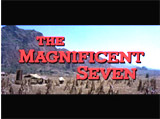
The Magnificent Seven (1960), 126 minutes, D: John Sturges
Director John Sturges' very popular, shoot-em-up western, with a memorable, Oscar-nominated score by Elmer Bernstein, was a westernized, 'updated' remake and adaptation of Akira Kurosawa's Japanese film epic The Seven Samurai (1954) about Samurai warrior-swordsmen that defended a 14th century village. The box-office "feel-good" hit inspired three sequels (1966, 1969, 1972) and a remake in 2016, and a late 1990s TV series. The ensemble film was mostly a character study of the seven demythologized gunslingers, all basically drifters who came together to serve as a vigilante force to protect a terrorized Mexican town and its oppressed peasant villagers from invading and pillaging bandits, led by gold-toothed Calvera (Eli Wallach). There was a mixed bag of motives for each of the gunfighters to accept the job - greed or fortune seeking (thoughts of a possible treasure), a chance at employment, to seek sanctuary or protection from the law, moral and social conscience issues, and just plain adventurism. The film made stars of many of its macho actors - members of a gun-slinging American outlaw band known as the 'magnificent seven.' The low-paid group of misfit, mercenary gunmen included Yul Brynner (as sensitive and reluctant black-clad Cajun leader Chris Adams concerned about social injustice), Steve McQueen (as easy-going gambler/drifter Vin Tanner), Charles Bronson (as Irish-Mexican wood-chopper Bernardo O'Reilly), James Coburn (as enigmatic, knife-throwing, enigmatic loner and cowpuncher Britt), Robert Vaughn (as dapper, fugitive gunman Lee), Horst Buchholz (as young, vulnerable and hot-tempered Chico from a peasant family who idolized Chris) and Brad Dexter (as greedy and cynical Harry Luck). During preparations for the showdown with the outlaws, the 'Seven" trained the villagers to defend themselves (by building a fortifications-wall and an entrapping drop-net), and also befriended the children - especially O'Reilly who became a beloved father figure. Even Chico fell in love with local peasant girl Petra (Rosenda Monteros). There were two initial deadly skirmishes with members of Calvera's marauding gang before the final confrontational shoot-out. The first to be fatally shot was Harry, followed by Lee, O'Reilly (who died in the arms of children), and finally Britt. Afterwards, only three of the seven were left -- Chico (who decided to remain in the village to marry Petra), Chris, and Vin, and the film concluded with Chris' pessimistic words to Vin as they passed the gravesite of their fallen companions: "The Old Man was right. Only the farmers won. We lost. We always lose."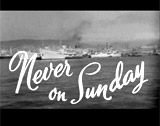


Never on Sunday (1960, Greece/US) (aka Pote tin Kyriaki), 91 minutes, D: Jules Dassin
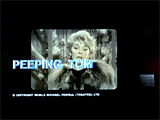


Peeping Tom (1960, UK), 109 minutes, D: Michael Powell




Psycho (1960), 109 minutes, D: Alfred Hitchcock
This was the greatest, most influential Hitchcock horror/thriller ever made and the progenitor of the modern Hollywood horror film, based on Robert Bloch's 1959 novel. The classic, low budget, manipulative, black and white tale included the most celebrated shower sequence ever made. The story also included the untimely, violent murder of the main protagonist early in the film, a cross-dressing transvestite murderer, insanity, a stuffed corpse, and Oedipal Freudian motivations. The film opened with views of 1960s Phoenix as the camera above the city slowly descended into the window of a motel, where blonde real estate office secretary Marion Crane (Janet Leigh) was having a lunch-time tryst with her divorced lover Sam Loomis (John Gavin) who was experiencing financial difficulties (both his dead father's debts and alimony payments to his ex-wife). Worried about marital prospects after the brief lunch affair, Marion fled town in her car (after embezzling $40,000 from her real estate office). Coincidentally, at a stoplight where she was paused, her boss Mr. Lowery (Vaughn Taylor) gave her a puzzled look as he crossed the intersection in front of her. After sleeping by the side of the road, a California state trooper Patrolman (Mort Mills), with frightening dark glasses, stared at Marion through her car window and interrogated her on the side of the road. That evening, Marion was tormented by menacing, inner monologues from off-screen voices - her disintegrating mental state and self-destructive conscience (and physical weariness) caused her to look inward and punish herself - as she imagined and forecast events leading up to her capture. Through Marion's rainy windshield, she spotted a sign for a secluded, off-road Bates Motel, and noticed a haunted-looking Gothic house behind the motel. She met the motel's proprietor-manager Norman Bates (Anthony Perkins), and signed her name as "Marie Samuels" in his register; the nervous, amateur taxidermist son invited her to his back parlor to eat and engage in conversation with Marion amidst his stuffed birds. The psychotic, disturbed "mother's boy" was dominated by his jealous 'mother', rumored to be in the Gothic house on the hillside behind the dilapidated, remote motel. Norman perversely peeped through a hole in the wall at Marion undressing in her hotel room. In the film's shocking, carefully-edited, dialogue-less shower murder scene, a blurry female figure wielding a knife high in the air entered Marion's bathroom as she showered. The scene was at first a purifying act that shockingly turned violent with the violin-screeching soundtrack of Bernard Herrmann timed to the repeated stabbings, the ting-ting-ting sound as the shower curtain rings pulled off the rod, and the image of bloodied water spiraling down the drain that dissolved into a close-up of dead Marion's stationary open eye. Norman's screams were heard coming from the Gothic house on the hill behind the Bates Motel: "Mother! Oh, God! Mother! Blood! Blood!" And then at the bathroom door after viewing the curtain-less shower and the dead body, Norman turned away and cupped his hand to his mouth. Norman laboriously cleaned-up the murder scene, deposited Marion's corpse in his car's trunk, and drove the car to the nearby swamp. He stood by nervously and nibbled at candy as the car slowly gurgled lower and lower as it descended into the muck. Norman and private investigator Milton Arbogast (Martin Balsam) engaged in a tense conversation at the front desk when he arrived to investigate Marion's strange disappearance. When Arbogast came too close to the truth, he was shockingly murdered at the top of the Gothic house's staircase when he snuck back there to investigate and speak to Mrs. Bates; a high-angle overhead shot followed his unbalanced fall backwards down the entire length of stairs - and then after hitting the floor, he was relentlessly stabbed, presumably by Norman's "mother." Then came another revelation by Deputy Sheriff Al Chambers (John McIntire) during a conversation with Sam and Marion's sister Lila (Vera Miles) about who was buried in Greenlawn Cemetery - he claimed that Norman's mother had died in a murder-suicide ten years earlier and was buried there. While snooping around the Gothic house behind the motel, Lila made a shocking, revealing discovery in the basement's fruit-cellar when she turned a chair holding an elderly woman - she saw Norman's mummified "Mother" under the swinging light casting ghastly images onto the wall; she shrieked in response. Behind her, Norman (in an old woman's clothes, signifying his split personality) attacked Lila with a knife, but was grabbed from behind by Sam and rescued. In the Chief of Police's office, smug and officious police psychiatrist Dr. Fred Richman (Simon Oakland) reconstructed or 'explained' the mystery of Norman's schizophrenic psychosis. He had most likely jealously committed matricide. He poisoned both his mother and her lover after he discovered them in bed together; to wipe clean his unbearable, intolerable crime, the remorseful Norman developed a split personality; in this way, he could keep the illusion that she was still alive; and to make that illusion a physical reality, he dug up and stole her body, and used his taxidermist skills to preserve and stuff her corpse, and keep her 'alive' in his house. The next-to-last image was of the psychotically-crazed Norman wrapped in a blanket with his Mother's voice-over, who condemned her son for the crimes while she claimed that she was harmless. The film's final image - a dissolve into the dredging of the swamp - showed that Marion's car with her body and the almost-$40,000 in the trunk was being hauled trunk-first from the muck by a heavy clanking chain on a winch.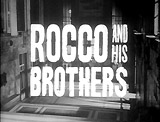

Rocco and His Brothers (1960, It./Fr.) (aka Rocco e i Suoi Fratelli), 177 minutes, D: Luchino Visconti
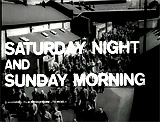


Saturday Night and Sunday Morning (1960, UK), 90 minutes D: Karel Reisz
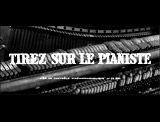

Shoot the Piano Player (1960, Fr.) (aka Tirez Sur le Pianiste, or Shoot the Pianist), 80 minutes, D: François Truffaut

Sons and Lovers (1960, UK), 103 minutes, D: Jack Cardiff
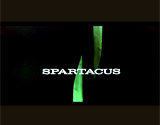


Spartacus (1960), 197 minutes, D: Stanley Kubrick
Director Stanley Kubrick's somewhat dated, uneven yet magnificent historical costume (and sword and sandal) epic was adapted by openly-credited, blacklisted screenwriter Dalton Trumbo (thereby breaking the abhorrent system) from left-leaning Howard Fast's 1951 fictionalized novel about a slave revolt in Rome between 73-71 BC. During the wide-screen Technicolored film's production, there was a change of directors early on (from Anthony Mann (famous for El Cid (1961)) to the young Stanley Kubrick, who wasn't permitted his usual directorial freedom, resulting in a decidedly un-Kubrick-like film) and rampant ego clashes amongst the actors. Although anachronistic in costuming and accents, and overly long with some 'wooden' acting, Spartacus remains one of the more beloved and intelligent gladiator films (and a model for Ridley Scott's Gladiator (2000)). At the time, with a budget of $12 million dollars, it was considered one of the most expensive Hollywood productions ever made. In its story of Spartacus (Kirk Douglas), the title character was first introduced as a third-generation Thracian slave in the Libyan mines who was sold to slave trader Lentulus Batiatus (Best Supporting Actor award winning Peter Ustinov), and became under his training a skilled gladiator at Capua. He was forced, for pure entertainment's sake, to fight to the death and kill fellow gladiator/friend Draba (Woody Strode), a giant black man. Growing resentment forced Spartacus to kill his captor-owner and instigate a bold revolt among his fellow slaves. He was joined by his slave wife Varinia (Jean Simmons). He moved from town to town in the countryside and recruited freedom-fighting slaves along the way, threatening Rome itself and fueling a power struggle and in-fighting between two influential figures in the ruling class: the philosophical political leader and Roman Senator Lentulus Gracchus (Charles Laughton) and the power-hungry, cruel Roman general Marcus Licinius Crassus (Laurence Olivier). [Note: During production, due to the National Catholic Legion of Decency and the restrictive Hays Code, various segments were removed, among other things, homosexual innuendo and various depictions of gore (such as severed limbs). The 1991 re-release of Spartacus restored much of what was cut from the film, including the notorious bathhouse scene featuring the sexual advances of Crassus toward his attractive slave servant-poet Antoninus (Tony Curtis), with dialogue dubbed by Anthony Hopkins for the deceased Olivier: "Do you consider the eating of oysters to be moral and the eating of snails to be immoral?... My taste includes both snails and oysters." Antoninus was able to escape and join Spartacus' army.] Eventually, Spartacus' forces of 60,000 slaves were overwhelmed by the three armies of Crassus. Memorably powerful scenes included large scale battles with thousands of extras, and the very moving "I am Spartacus!" scene when captured slave Spartacus was protected from being exposed by other slaves claiming his identity. (Meanwhile, Varinia bore Spartacus' baby son, and was taken into Crassus' household as a slave, where he became desirous of her sexual favors. However, she remained steadfastly loyal.) The remaining 6,000 defeated slaves were marched to Rome under Crassus' orders, and crucified along the way on both sides of the 132 mile-long Appian Way between Capua and Rome. Following Crassus' forced duel-to-the-death between Antoninus and Spartacus that ended with Antoninus' mercy-killing, the victor was crucified outside of Rome. The disguised Varinia risked capture to show Spartacus his infant son before he perished.

The Sundowners (1960), 133 minutes, D: Fred Zinnemann


The Time Machine (1960), 103 minutes, D: George Pal
Producer/director George Pal's and MGM's science fiction classic, based upon H.G. Wells' 1895 novel 'The Time Machine' told about travel across vast amounts of time and space. The influential film, shot with Metrocolor, won the Oscar for Best Special Effects (its sole nomination). The most exceptional scenes in the film were the amazing time-lapse photography (also with stop-motion animation and traveling mattes) employed in the scenes of fast-forward travel in the 'time machine.' The film's tagline advertised: "You Will ORBIT Into the Fantastic Future!" Its budget of $850,000 was spread out and used for many fantastic effects in its depiction of centuries of time, including Victorian England at the turn of the century, three World Wars (with the Blitz, nuclear explosions and lava flow), and a post-apocalyptic future with underground caverns and frightening creatures. The film opened on January 5, 1900, as four gentlemen met at 8 pm at the London residence of their friend, scientist and inventor "George" (Rod Taylor) (representing author Wells); they had met five days earlier on December 31, 1899, and were reinvited back for dinner. Their conspicuously-absent host "George" (Time Traveler) arrived late - appearing in the dining room doorway, disheveled, exhausted, with a torn shirt and dirt on his face. In a flashback, he told what had happened to him over the five day period since their previous dinner party, with a flashback to their earlier dinner meeting. He demonstrated his latest invention - a small-scale model of a time machine (with a cigar impersonating an individual seated on it). By pushing a tiny lever on the front control panel, it disappeared and vanished into the future. George also announced he was planning to take a journey into the future. After the disbelieving guests left (and were invited to return five days later for dinner), George retreated to his laboratory (a converted greenhouse with glass windows) - the location of his full-scale 'Time Machine' - a duplicate of the miniature model. As the film progressed, there were multiple stops along the way in his 'time travel' journey to the future. After surviving the Great War of 1917, the English "Blitz" in 1940, air-raid warnings and an atomic blast in 1966 (followed by a volcanic eruption), he arrived in the far future year of 802,701. After his time machine spun wildly and tossed him to the ground, he wandered into a magnificent green garden area with flowers (and devoid of weeds or briars) - a seeming paradise or utopian world. He found a group of young people (carefree, and innocent-looking barefooted men and women in thin pastel-colored robes) who were swimming, sunbathing, romping, and playing in the sunshine. When others ignored the plight of a drowning female, he dove in and rescued her, although she was unemotional and showed no signs of gratitude. Through his interactions with the young people and the girl named Weena (Yvette Mimieux), he discovered their post-apocalyptic world appeared after an earlier nuclear holocaust. Mankind had been divided into two groups - the passive, vegetarian, childlike, illiterate and carefree Eloi and the monstrous underground-dwelling, cannibalistic mutants known as Morlocks who controlled society, and bred the Eloi like cattle. The Eloi were illiterate, emotionless, didn't value life, lacked inquisitiveness about life or learning, and had no government or set of laws; they also didn't work, and were somehow provided with their clothing and food. Determined to return to his own time due to his frustrations: ("The human race reduced to living vegetables"), he then discovered that his time machine had been dragged inside a temple's locked doors and was inaccessible. When air-raid sirens went off and the Eloi (including Weena) marched expressionless and trance-like into the metal doors of the temple to their doomed fate, "George" realized they had been summoned to their deaths. He entered an open, domed concrete air-shaft or well structure, to reach the underground cavern, to rescue Weena and other captives. He discovered that the Morlocks were carnivorous cannibals feasting on the Eloi. He was able to fight off the half-human, half-ape creatures with bright light and fire, and led the Eloi to safety. Feeling trapped and "imprisoned in a world in which I just did not belong," he was informed that the temple's doors were open and he could retrieve his time machine to travel back in time - possibly with Weena. When he approached his time mechanism, the doors closed behind him (and locked Weena out) and he was trapped inside the temple with the Morlocks on the attack. He activated his time machine to escape back to Victorian England, arriving on January 5, 1900. He barged into the dinner party planned earlier, appearing exhausted but safely home. His dinner guests were skeptical, calling his tale "preposterous," "ridiculous," and "a good yarn"; even George admitted he could hardly believe what had happened to him. Disbelieving, the entire group soon left. In the film's speculative epilogue, his best friend among the guests - a concerned David Filby (Alan Young) - returned to the house after briefly leaving, but realized after hearing the start-up noises of the time machine in the greenhouse that his friend was taking another time-travel adventure. David speculated that "George" wouldn't return "empty-handed to try to rebuild a civilization without a plan" - and had taken three books with him (noticed missing from the shelves), to help the Eloi build a new world and to build a new world for himself; when asked if he might return some day: "Mister Filby, do you think he'll ever return?", Filby answered (with the film's last line): "One cannot choose but wonder. You see, he has all the time in the world."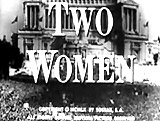

Two Women (1960, It./Fr.) (aka La Ciociara), 93/100 minutes, D: Vittorio De Sica


The Virgin Spring (1960, Swe.) (aka Jungfrukällan), 89 minutes, D: Ingmar Bergman
Set in medieval, 14th century Sweden. Wealthy and religious land-owning farmers Tore (Max von Sydow) and Märeta (Birgitta Valberg) have only one surviving child - innocent, vain, naive and virginal daughter Karin (Birgitta Pettersson). Her jealous step-sister, pregnant maid-servant Ingeri (Gunnel Lindblom), invokes a pagan curse upon Karin after praying to the Norse deity Odin. During a journey to the nearest village's church on the celebrated day of Our Lady of Virgins, Karin is assaulted by a group of goatherd brothers, two adults and an adolescent, and is ultimately raped and murdered. The crime is witnessed by Ingeri. The three find refuge at Tore's farm for food and shelter, where he learns of their deadly assault and avenges his daughter's murder. The same plot served as the basis for Wes Craven's horror film The Last House on the Left (1972).